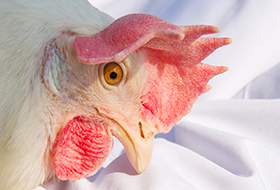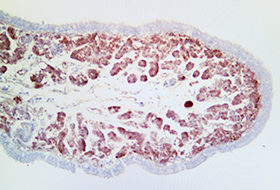 |
| |
 |
| |
|
The key research subject is the chicken’s immune functions to reduce bacterial contamination of eggs
|
| |
 |
|
Hiroshima University has traditionally been vigorous in conducting research using chickens. Professor Yoshimura is one of the researchers who have inherited this tradition.
“I have been committed to research with a particular focus on clarifying the mechanism that prevents oviduct and ovary infection by microbes. By elucidating the immune system of these reproductive organs and thereby enhancing the biological defense functions, healthier chicken eggs can be produced. These eggs will be safe food, which will benefit human health.” says Professor Yoshimura.
Infection prevention using antibodies or white blood cell has frequently been researched since a long time ago. His research is a further extension of this research. |
|
| |
“Past studies have confirmed that components called ‘antimicrobial peptides,’ which kill a wide spectrum of microorganisms, work in chickens as well. Nevertheless, it has remained unclear how these peptides are expressed in reproductive organs. We aim to clarify this.”
According to the Professor, researchers thus far have found that antimicrobial peptides are expressed either in the ovary or the oviduct, and that antimicrobial peptides function in these egg-producing organs and may be incorporated into eggs as well.
Professor Yoshimura states “I presume that antimicrobial peptides are working in eggs to defend against microbial invasion. However, we have not yet obtained evidence for this hypothesis. I will continue to push forward with research to discover the evidence.” |
|
 |
|
| |
|
One of the world’s leading research teams on the roles of antimicrobial peptides in productive organs
|
| |
 |
|
In the field of research into the functions of antimicrobial peptides in the oviduct and ovary, Professor Yoshimura’s research team takes the lead in the world, together with two European teams and with an American team. These teams have been advancing their research activities while mutually exchanging relevant information, according to the Professor. In what way will their research findings be used for our benefit?
He answers “A single antimicrobial peptide can combat several types of bacteria, and there are many varieties of antimicrobial peptides. Accordingly, if we can improve the chicken’s ability to produce antimicrobial peptides, various bacteria can be destroyed. We can expect that, in combination with specifically targeted vaccines, antimicrobial peptides that act against a wide range of bacteria will work to prevent infection.” |
|
| |
Poultry farmers around the world have established a rigid control system to keep salmonella from entering poultry. If antimicrobial peptides are made to work better, they may be used in tandem with vaccines, enabling poultry farmers to take effective measures against more bacterial strains. So what should we do to strengthen chickens’ ability to produce antimicrobial peptides?
Professor Yoshimura admits that in fact his team does not yet have an overall perspective of this issue.
He says “We have just commenced studying how to enhance production of antimicrobial peptides using probiotics, such as lactic acid bacteria and other beneficial bacteria. The digestive tract, including the stomach and intestines, also has the function of producing antimicrobial peptides. We are now investigating whether this function can be improved with probiotics. In the future, we hope to find a way to produce antimicrobial peptides in various organs of chickens.” |
|
 |
|
| |
|
His laboratory is characterized by a wide range of observation objectives. Students have much to gain from many opportunities for teamwork.
|
| |
|



|
|
Professor Yoshimura is also well-versed in the field of research into chicken reproduction. Let us now review the process of chicken egg formation.
The yolk is produced in the ovary, whereas the albumen, shell membranes and shell are produced in the oviduct. Immediately after a yolk is ovulated from the ovary, if sperm enters the yolk, fertilization occurs. A fertilized egg comprises this yolk, around which the albumen and shell membrane are formed.
“Avian sperm can survive in the oviduct for two to three weeks, whereas human sperm cannot last even a day. We are also studying why avian sperm can live so long in the oviduct. There are many questions to be clarified regarding avian reproductive functions.”
Professor Yoshimura decided to pursue his present research work because of his professor, who inspired him in the laboratory. What is it that is interesting about his work?
He replies “I am pleased to be able to work for food production, an important theme, in collaboration with students —both Japanese and international, as well as with researchers inside and outside of the country. I also find it characteristic of our laboratory that our observations are very wide-ranging — we carry out observations not just at the genetic level; we also look at cells and tissues through a microscope, and see with our own eyes the animals that we breed.”
Professor Yoshimura also expresses his expectations for undergraduate and postgraduate students, saying “In my laboratory, they have many opportunities to work as a team in, for instance, raising chickens. Through such teamwork, I hope that my students will properly acquire the ability to think creatively, while valuing human relationships. According to Professor Yoshimura, his research laboratory attracts hard-working students, and has produced many outstanding researchers. |
|
| |
| Yukinori Yoshimura |
Professor(Special Appointment)
Laboratory of Animal Histophysiology
Department of Bioresource Science
Graduate School of Biosphere Science, Hiroshima University
June 1, 1983 – March 31, 1991 Research Associate,
Faculty of Applied Biological Science, Hiroshima University
April 1, 1991 – May 31, 1994 Associate Professor,
Faculty of Applied Biological Science, Hiroshima University
June 1, 1994 – March 31, 1999 Professor,
Graduate School for International Development and Cooperation, Hiroshima University
April 1, 1999 – March 31, 2002 Professor,
Faculty of Applied Biological Science, Hiroshima University
April 1, 2002 – March 31, 2019 Professor,
Graduate School of Biosphere Science, Hiroshima niversity
April 1, 2019 – March 31, 2021 Professor,
Graduate School of Integrated Sciences for Life, Hiroshima niversity
April 1, 2021 – Professor(Special Appointment),
Graduate School of Integrated Sciences for Life, Hiroshima niversity
Posted on Jul 10, 2014
|
| |









